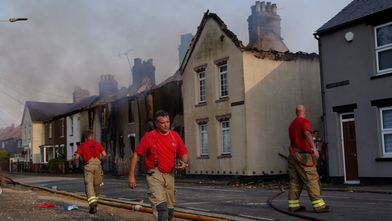New Delhi: Hundreds of firefighters battled blazes across England on Tuesday as temperatures surged to a historic high of 40.3C. Constant two days of extreme heat that scientists warn is “a wake-up call” for the climate emergency.
The temperature is set to drop by up to 10C in some areas on Wednesday, with heavy showers and thunderstorms predicted in parts of northern England and southern Scotland, with the potential for localized flooding, lightning strikes, transport disruption, and power cuts.
On Tuesday evening a band of showers began crossing England, although the Met Office said the air was so dry that very little was reaching the ground. Wednesday’s rain was forecast to be much heavier. The Met Office has declared a yellow warning for thunderstorms for parts of the south-east, east, and central England in the afternoon and evening.
While it will be fresher for most places, some parts of East Anglia will still see temperatures reach as high as 30C.
Fire brigades in London, Leicestershire, Norfolk, and South Yorkshire were among those to declare major incidents as flames destroyed buildings and devoured tinder-dry fields in Wennington, east London, grasslands elsewhere in the capital, and in Groby, Leicestershire. Nine of the UK’s 12 hottest days since 1884 have now occurred within the last two decades.
Hannah Cloke, a professor of hydrology at the University of Reading, said this week’s red warning for extreme heat was “a wake-up call about the climate emergency. If record-breaking weather extremes and energy price shocks that affect everyone don’t convince our leaders that some serious stepping-up of policy is required, then I don’t know what will.”
As Britain sweltered, Scotland recorded a new 34.8C temperature record (1.9C above the previous 2003 high) and hospitals scaled back the number of planned surgeries and installed cooling units for IT server rooms.
The east of England ambulance service reported emergency calls were up, an A-road became buckled like “a skatepark” and the East Midlands and East Coast mainlines closed because of the heat. Trains out of London Euston were suspended due to a lineside fire, with the blaze igniting when 25,000-volt overhead electric cables came down. Birmingham New Street was also closed to all trains due to damaged overhead power lines.
(Vinayak)

